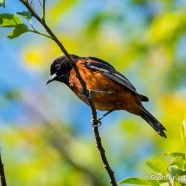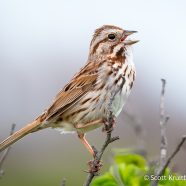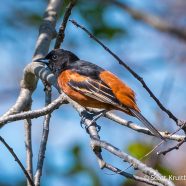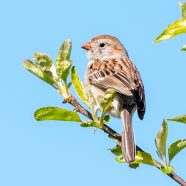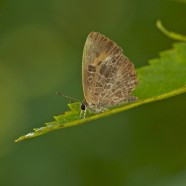Orchard Oriole
This adult male Orchard Oriole finally gave me a decent couple of poses on a recent morning! My guy was foraging, singing, and defending his territory against various avian intruders when he paused to let me shoot him for a few seconds. His chestnut-like tones look fantastic against the green leaves and blue sky. Someday I want to get a photo of an Orchard Oriole and a Baltimore Oriole for a better visual comparison of their sizes. Orchards are noticeably smaller than their cousins, just a bit larger than our vireos and warblers. It is hard to believe this fella will be heading south for the...
Read MoreSinging Song
This can be the quietest time of the season for some Song Sparrows (Melospiza melodia) as they keep their incessant and resonant voices down after having established territory, found a mate, and successfully built a nest. You do not want to advertise quite as much when there are eggs and young to protect, but sometimes you do have to keep an eye on your property and belt out a tune or two.
Read MoreOrchard Oriole
This adult male Orchard Oriole (Icterus spurius) is a Stratford Point resident, deftly avoiding our cameras for the most part while feeding mostly in the canopy. Occasionally he drops down closer to eye level, and he has been seen copulating with our resident female. It is likely that we will once again have a nesting pair on site. The family grows up quickly though, and even by the end of July this guy may be heading back to Central America. When they are not vocalizing they can be surprisingly inconspicuous. This is probably the best time of year to get some good views of them without...
Read MoreField Sparrow
The fields are alive with the sound of music…and in this case it was the voices of many Field Sparrows (Spizella pusilla) singing on territory in the grasslands and open country across the region. Let’s all focus on keeping our open habitats healthy and available for birds like this! Development and unchecked regrowth of forests without natural wildfires will all but eliminate them otherwise while invasives, monocultures or chemicals can degrade them further. Sometimes we have to work to preserve nature after all we have done to modify our natural world. Scott Kruitbosch...
Read MoreHarvester Butterfly
Here is a shot of the Harvester (Feniseca tarquinius) butterfly in its natural habitat, the world around it is as green as can be. Get out in that hot air today and dig up some treasures for yourself! Photographed by RTPI Affiliate Sean Graesser in Connecticut while on assignment for the Roger Tory Peterson Institute of Natural History.
Read More



